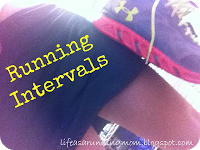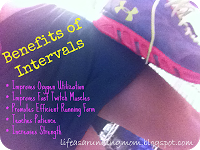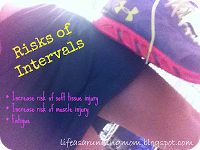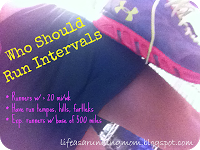
How is that for an answer? Ambiguous right? But the thing is, training plans and strategies are not one size fits all and even though I am a huge proponent for running intervals, that doesn't mean everyone should head out today and do so. There are risks. But there are also benefits so let's review what intervals are and if you are ready to run them.
What is interval training? Intervals are specific speedwork that consists of a set number of repetions at a set distance and a set pace with a specific recovery. For example, today I ran mile repeats for my intervals. I started with a 1/2 mile warm-up, ran a mile at 8'00" pace, 1/2 recovery pace, mile at 8'00" pace... I completed four intervals. You may see this noted as such on a training plan: 4x1600m @ 8'00" w/ 0.5 mile recovery at 10'00". This is how intervals are different from fartlek runs where you randomly pick up the pace and ease back. Intervals are structured and specific and have an intended purpose. And it is best to run them where you know the exact distance. A track is awesome but soft terrain works well too as long as you know the distance. My intervals today were on the lovely gym treadmill. Gotta love it!
 What are the benefits of running intervals? Intervals can be tough but they are not full sprint tough. They are beneficial since running intervals trains the cardiovascular and muscular systems to better utilize oxygen while removing carbon dioxide and lactic acid. They improve your fast twitch muscles functioning and this is good since these fibers tend to fire fast and tire quickly. They come into play in anaerobic conditions and you want strength here. The two things I love about intervals is that running them can promote more efficient running form (I do feel my body pulling into shape) and teach patience with low grade physical discomfort. And intervals improve strength.
What are the benefits of running intervals? Intervals can be tough but they are not full sprint tough. They are beneficial since running intervals trains the cardiovascular and muscular systems to better utilize oxygen while removing carbon dioxide and lactic acid. They improve your fast twitch muscles functioning and this is good since these fibers tend to fire fast and tire quickly. They come into play in anaerobic conditions and you want strength here. The two things I love about intervals is that running them can promote more efficient running form (I do feel my body pulling into shape) and teach patience with low grade physical discomfort. And intervals improve strength. With all those good benefits, why not run intervals right now? Well, there are risks.
With all those good benefits, why not run intervals right now? Well, there are risks.What are the risks of running intervals? You could be risking injury to soft tissues and muscles or fatigue. This list isn't too long but a serious injury could sideline you longer than you would like.
Who should run intervals? I think we all can as soon as we are ready. Runners need a solid base before adding on other elements.
 If you are running more than 20 miles a week and have done tempo runs, hills, and fartleks, you may be ready! If you add in that you are an experienced runner with a base of 500+ miles you are definitely ready! Having one 20 mile week in which you do one tempo, one hill session, and one fartlek doesn't give you the green light just yet. Keep building up your pace and by golly, listen to your body!
If you are running more than 20 miles a week and have done tempo runs, hills, and fartleks, you may be ready! If you add in that you are an experienced runner with a base of 500+ miles you are definitely ready! Having one 20 mile week in which you do one tempo, one hill session, and one fartlek doesn't give you the green light just yet. Keep building up your pace and by golly, listen to your body!Finally, I have to add, consult with your doctor before making any changes in your current exercise program. I am a certified RRCA adult distance running coach and feel comfortable sharing knowledge but want to say, running can be dangerous if you jump in with both feet and don't pay attention. And since running isn't one size fits all, it is always good to ensure you are on the best path for yourself!
Happy Running!
Daily Gratitude: I am thankful for the warm sweater dear hubby brought to me at work.
Daily Affirmation: I am at one with myself.
If you liked this post, you may also like Running Doubles: Should you do it?, Tempo Runs: Why run them?, or Am I Overtraining?.
